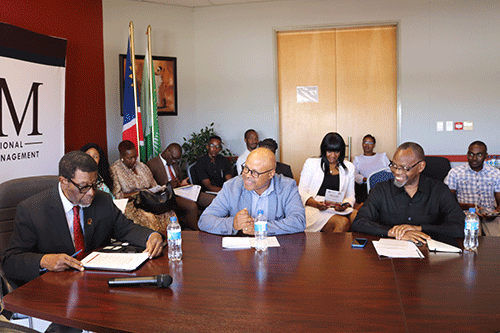The theory and practice of knowledge management are tools for supporting development and enhancing the competitiveness of organisations.
There is, therefore, an urgent need for countries and organisations to create strong management systems to ensure a knowledge-based economy (KBE), which was captured through Vision 2030 and various national development plans (NDPs).
The International University of Management (IUM) on Tuesday launched the Namibia Knowledge Management Forum at their main campus, a platform that seeks to create a network to further the interests of KM and innovation. In his opening remarks at the launch, IUM vice chancellor professor Oladele Arowolo said “the forum will complement the postgraduate diploma and MSC courses that the institution will offer as from next year, further providing exposure for students to the wealth of expertise found in Namibia and neighbouring countries.” He emphasised that African countries, and Namibia in particular, will create resilience to issues such as climate change, global warming and alternative sources of energy only if they capitalise on the new resource of KM to further increase productivity, service delivery and become more internationally knowledge-driven.
There is, thus, a need to embrace new approaches to socio-economic development and the management of organisations in order for developmental goals and visions to be achieved, and to create knowledge-intensive organisations.
On his part, the CEO of the New Era newspaper Christof Maletsky, as a stakeholder of the forum asserted that despite KM being a new concept in media, especially print media, it is a key guide in the “upskilling and reskilling of employees so as to improve productivity, enhance staff development and quality assurance”.
He acknowledged the role media can play to promote KM initiatives for the development of the country, considering that “it is within acceptable ethics and boundaries of good journalism”. Other stakeholders of the forum include the Namibian Broadcasting Corporation, the United Nations International Children’s Emergency Fund, NamPower and the National Information Workers Association of Namibia (NIWAN).
Other participants in the forum included participants from as far as Kenya, Eswatini,
Zambia, Tanzania and South Africa.


